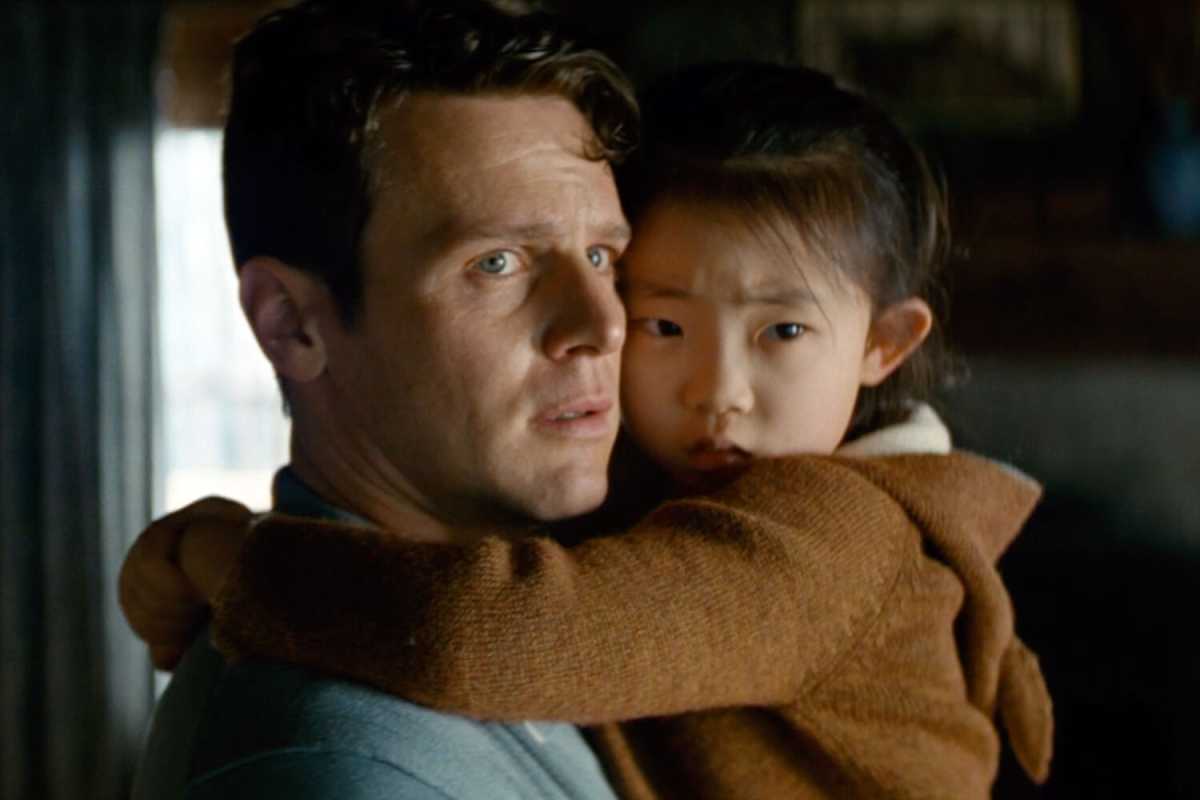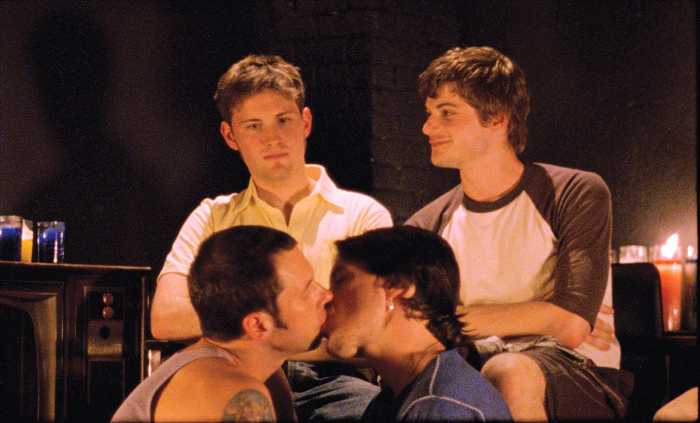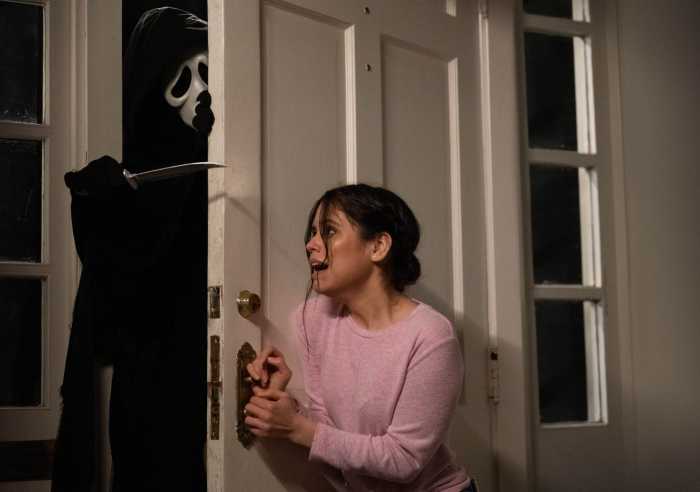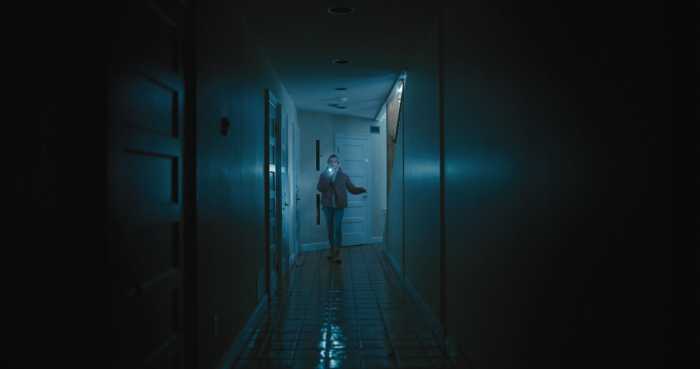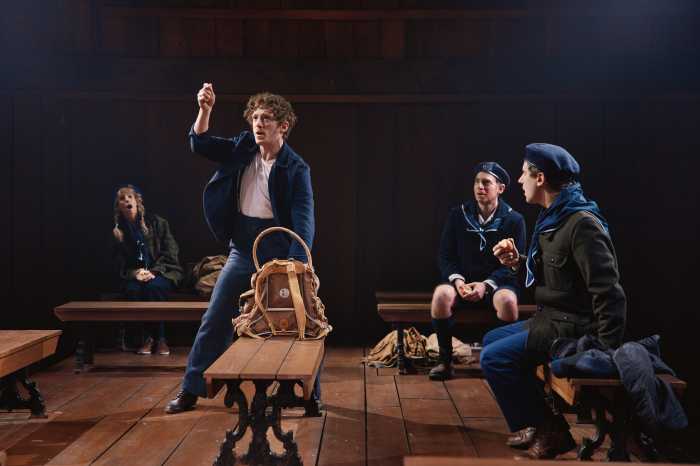Night Shyamalan’s disinterest in looking cool hasn’t always served him well, but even his worst films benefit from an underlying sincerity. His work is an intriguing mixed bag, where his considerable skill as a director rarely matches his weakness for plot twists, which actually detract from his most enigmatic ideas. He’s too much of a populist entertainer to let real mysteries lie, which can turn his films into deflated balloons. However, his last few films have achieved a decent balance, with their visual style transcending his scripts’ flaws. “Knock at the Cabin” swings again at the end of the world, one of his favorite subjects, only to fall flat on its face.
Adapted from Paul Tremblay’s horror novel “The Cabin at the End of the World,” “Knock at the Cabin” takes place during Andrew (Ben Aldridge) and his husband Eric’s (Jonathan Groff) vacation with their 7-year-old daughter Wen (Kristen Cui.) While she’s out gathering grasshoppers to put in a jar, Leonard (Dave Bautista) approaches her. Arriving with ex-con Redmond (Ruper Grint), nurse Sabrina (Nikki Amuka-Bird) and cook Adriane (Abby Quinn), all of whom are carrying weapons, they barge into the cabin where the family is staying. Leonard insists that an apocalypse is approaching and can only be prevented by one family member volunteering to sacrifice themselves. Andrew and Eric are tied up and forced to listen to their intruders, who prove willing to kill each other for their cause. However, cable TV news provides evidence that Leonard’s words are true, as the world outside spirals into chaos.
Shyamalan gets a first-rate performance out of Bautista. He has a particularly tough role because Leonard is completely unbelievable as a person, even in a filmography loaded with characters more mythic than human. Talking to Eric, Andrew lays out the symbolism of their visitors as the four horsemen of the apocalypse. While Leonard insists upon his benevolence, Bautista, who used to be a wrestler, is an enormous, muscular man decked out in clothes that don’t fit his frame well. Meanwhile, Andrew refuses to take the spiritual dimensions of their experience seriously. Shyamalan capably uses close-ups and sudden shifts in focus to build up the tension within the cabin, but even at 100 minutes, the film never develops far beyond its initial ideas. For once, Shyamalan’s twist is the premise.
“Knock at the Cabin” is a deeply misanthropic film, coated with a Christian patina for concealment. (The decision to move murder and suicide offscreen contributes to the mood of sanitized cruelty.) Further, even Shyamalan’s more dubious takes on the possible end of the world have never felt this empty before. Beyond the religious references, this film’s narrative and imagery carry tremendous baggage about climate change, now that extreme weather has popularized secular versions of apocalyptic ideas. Its ideas about sacrifice make little sense. Although Eric and Andrew appear to be relatively privileged, their lives look miserable. They’re rarely shown enjoying a moment of happiness; instead, “Knock at the Cabin” zooms in towards the pain in their lives caused by homophobia. Redmond may be the man who broke a beer bottle over Eric’s head in a bar after calling him a slur. In flashbacks, they’re treated badly by their parents and an adoption agency. But crucially for this film’s eventual destination, their differing degrees of faith are a source of tension.
Placing a gay couple as the protagonists of a story where their sexuality is apparently incidental is progress. However, Shyamalan and his co-writers Steve Desmond and Michael Sherman have not thought through their scripts’ implications. The Christian concept of the nobility, even necessity, of sacrifice can be put to very dubious uses. While “Knock at the Cabin” captures some of the isolation and odd forms of magical thinking that dominated America’s last few years, it’s so removed from the real world that it winds up being offensive. It’d be one thing if we knew why this gay couple were singled out, but the film presents Andrew’s skepticism as ultimately ludicrous.
Critic Sam Adams wrote that “They’ve settled into a monogamous relationship, adopted a child, done everything the world has told them they have to do in order to win acceptance, and god still sends a homophobic bigot to tell them to kill themselves?…in the movie, Andrew and Eric are a perfect couple and the prize for that perfection is death. They’re still proving they’re better than the bigots, even though the bigots will never know who saved them.”
The religious apocalypse of “Knock at the Cabin” plays as a cool concept rather than a demonstration of actual faith and concern, but it highlights the stiff price gay men are expected to pay for full access to American life. We’ve spent too much time being sacrificed already.
“Knock at the Cabin” | Directed by M. Night Shyamalan | Universal Pictures | Playing citywide

